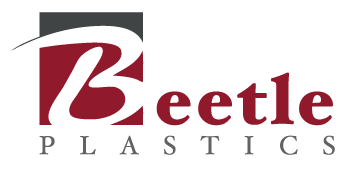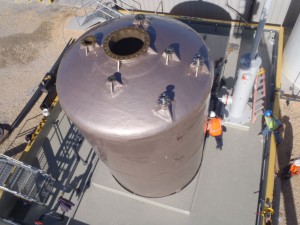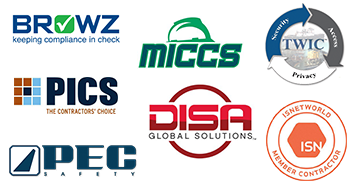Chemical Vessels
Specially Engineered, Corrosion-Resistant Fiberglass Reinforced Polymers
At Beetle we manufacture specially engineered, corrosion-resistant fiberglass reinforced polymers (FRP). We serve a broad range of industries including power generation, wastewater treatment, chemical processing, and mining and minerals.
We’ve cultivated far-reaching capabilities and a deep understanding of FRP that enables us to fabricate custom high quality FRP products, such as vessels, made to specification.
FRP are viewed as the go-to material for managing corrosion with non-metallics; FRP is particularly well suited for many highly corrosive chemical environments such as hydrochloric acid, sulphuric acid, chlorine dioxide, and sodium hypochlorite. When designed properly FRP materials can provide excellent high-temperature capabilities and solvent resistance.
Key Specs for Beetle Vessels
• Standard and custom diameters up to 14’, with heights as required
• Standard and custom materials, custom formulations available
• Engineered to meet your service requirements and specifications
• Custom components, fittings, connections, valves, and ports available
• Contact molded, filament wound and hoop configurations
• Exterior surface treatments including gel coats and resin rich layers
• Integrated lifting lugs
FRP imparts design flexibility and allows the end-user to employ its technology in a variety of vessel and tank applications such as, chemical storage tanks, solvent extraction vessels, process reaction vessels and pressure vessels. Utilizing FRP has many advantages including long life cycles, reduced maintenance costs and corrosion resistance.
Regardless of whether you are planning to build HCL absorber reflux vessels or HCL acid surge vessels, large acid storage tanks, such as a hypo tank or water process tanks, composite tankers, or absorber vessels for polyurethane—FRP is a cost-effective material choice.
FRP Can Be Utilized In Range of Chemical Process Applications
• Chemical and Mechanical Filtration
• Settling, Extraction and Leaching
• Distillation
• Recrystallization
• Precipitation
• Drying
• Absorption
Each service environment is unique and requires special attention to engineering considerations. Special considerations such as concentration, temperature, pressure, vacuum will need to be addressed to ensure that the product being fabricated is optimized to enhance its performance and meet your specifications. To a large degree your service environment and specifications will influence many important design elements such as resin selection, laminate schedule and corrosion barrier.
The corrosion barrier is typically fabricated with a resin-rich liner or corrosion barrier, followed by a glass-rich structural wall. The corrosion barrier is one component of the entire laminates schedule; it is a critical layer that must be designed properly in order to ensure effectiveness, safety and performance of your FRP product. Although the corrosion liner does not provide much in terms of mechanical properties it’s extremely important to the overall design of your composite product. The type and thickness of this barrier/liner and fabrication method will depend upon the specific service environment. We can customize the thickness of the corrosion/abrasion barrier to meet your requirements.
At Beetle we offer FRP leadership; design intelligence, far-reaching capabilities, capacity, and over 50 years of fiberglass experience. Let’s share a conversation and get started.
FRP Chemical Application Examples
• Aluminum Hydroxide
• Ammonia and Ammonium Nitrate
• Calcium Carbonate
• Carbon Dioxide
• Chlorine and Chlorine Dioxide
• Cumene
• Diammonium Phosphate
• Ethyl Alcohol and Ethyl Benzene
• Hydrochloric Acid
• Phosphoric Acid
• Potassium Hydroxide
• Sodium Hypochlorite
• Sulphur Dioxide
• Sulphuric Acid






